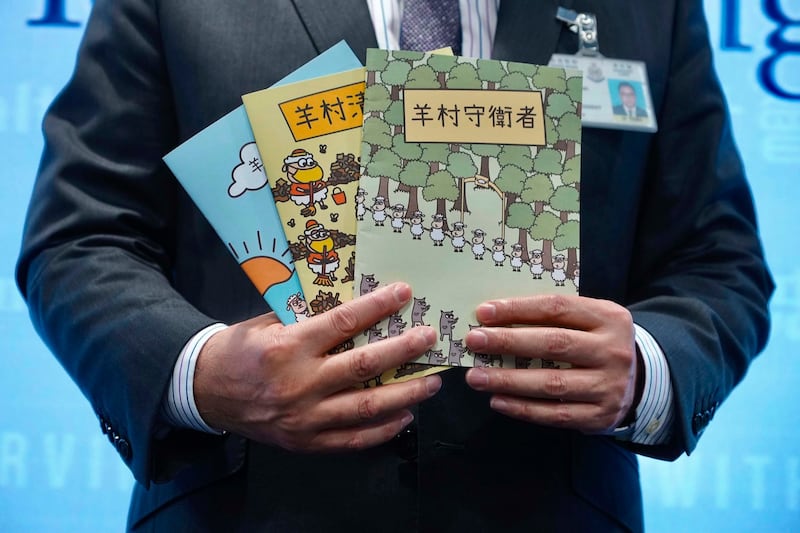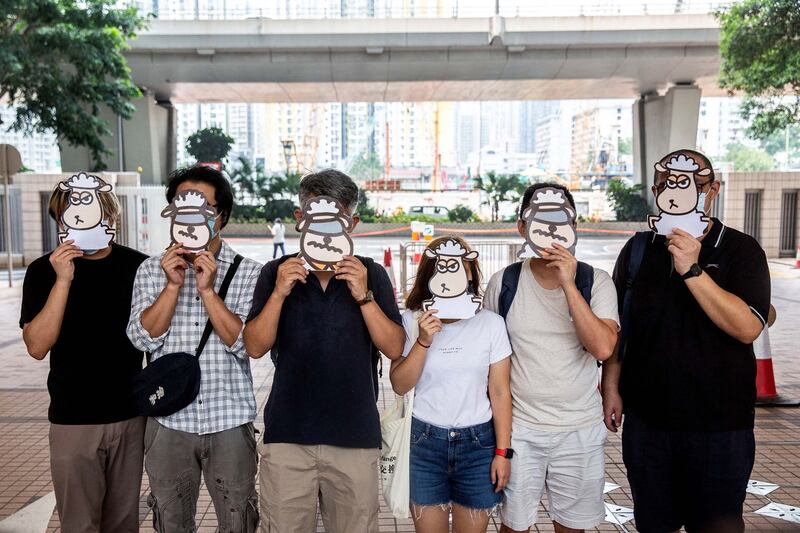Hong Kong authorities have banned a Malaysian rapper who recorded a satirical song about Beijing's 'fragility,' while two people have been arrested for possessing "seditious" children's stories about sheep amid a crackdown on dissent in the city under a harsh national security law.
Namewee had earlier announced his 16-city "Big Bird" world tour would kick off in Taipei in April, and 15 of those bookings have now been confirmed – with the exception of Hong Kong.
"I wasn't approved for Hong Kong," he told Radio Free Asia on Wednesday. "I don't know why -- it may be due to [political] pressure, because I have had gigs there before, and this time I'm suddenly not allowed."
"It's a bit unfair, but mostly to the people of Hong Kong," he said, pointing out that the ruling Chinese Communist Party had promised life in Hong Kong would remain unchanged for 50 years following the former British colony's 1997 handover to Chinese rule.
"It's not been 50 years yet, so why are there some concerts that aren't allowed?"
Namewee, the stage name for Huang Mingzhi, said the democratic island of Taiwan, which China has vowed to bring under its control, by force if necessary, was the easiest stop on his tour to book by far.
"Taipei was the freest of the stops on my tour to apply for, and not too much trouble," Namewee said. "Some other places even requested my song lyrics in advance for review of all performed content in advance, but there was nothing like that in Taiwan."
Namewee has been banned from China after he recorded a pop duet in October 2021 with Australia's Kimberly Chen titled "Fragile," which took aim at the country's army of nationalistic "Little Pink" commentators and trolls.
In the official video for "Fragile," which had garnered around 67 million views on YouTube by Wednesday, he and Chen sing repeated apologies to a dancing panda, who lives in a hobbit-style house and waves a flag bearing the online insult "NMSL," frequently used by Little Pinks to wish death on the mothers of those they believe have insulted China or hurt the feelings of its people.
China frequently demands apologies from companies and celebrities if they use sensitive words not in line with Communist Party propaganda, including the idea that Taiwan is a sovereign country that has no interest in being invaded or ruled by its larger neighbor.
‘Seditious books’
The rapper's Hong Kong ban came as national security police arrested two people on Monday for "possession of seditious books."
Two men aged 38 and 50 were arrested on Monday and are being held for questioning, government broadcaster Radio Television Hong Kong reported.

"Books seized in the operation are suspected of inciting hatred or contempt of the central and [Hong Kong] governments and the judiciary," the report quoted officers as saying.
The Times newspaper said the pair were found in possession of copies of books from children's series Sheep Village, whose authors were jailed for 19 months apiece under a colonial-era law for conspiracy to print, publish, distribute, display and/or reproduce seditious publications in September 2022 that had been mailed to Hong Kong from the U.K.
Lorie Lai, Melody Yeung, Sidney Ng, Samuel Chan and Fong Tsz-ho – all in their 20s – were members of the General Union of Hong Kong Speech Therapists, which has since disbanded alongside other civil society groups facing investigation by national security police.
Their children's picture book series depicts sheep trying to defend their village from wolves, a storyline that was deemed to glorify the 2019 protests and "incite hatred" against the authorities.
Resurrected law
In the sweeping colonial-era legislation under which the charges were brought, sedition is defined as any words that generate "hatred, contempt or dissatisfaction" with the government, or "encourage disaffection."
The law was passed under British rule in 1938, and is widely regarded as illiberal and anti-free speech. However, by the turn of the century, it had lain dormant on the statute books for decades, until being resurrected for use against opposition politicians, activists, and participants in the 2019 protest movement.
Eric Lai, visiting researcher at the Dickson Poon School of Law of King's College London, said an increasing number of national security cases are now relying on tip-offs to a national security reporting hotline, which received hundreds of thousands of reports last year alone.

"The government is willing to rely on the national security reporting hotline to enforce this law, as well as on the police," Lai said. "Police said they had received more than 400,000 national security reports [last year]."
"Such an atmosphere will definitely make people in Hong Kong think twice about what publications they own," he said.
Current affairs commentator Gary Tsang said the denial of Namewee's application was definitely linked to the ongoing crackdown under the national security law imposed by Beijing in the wake of the 2019 protest movement.
"This sends a very clear signal that national security is now the top priority in all areas, since the national security law took effect," Tsang told Radio Free Asia. "There are now very tight controls in place from the Hong Kong government on publications, and on art and literary circles."
"If the government feels that your political stance and overall line are different from its own, you won't be given a platform," he said.
‘Be cautious of you are a fragile pink’
Current affairs commentator Sang Pu said Namewee was given permission to perform in Macau, which has a similar national security law, but that Hong Kong was likely trying harder in the wake of the 2019 protest movement to show that it is toeing the Communist Party line.
"It's like a kind of global social credit system for artists," Sang said. "If you don't get enough points to pass the test, then they get rid of you."
"This makes it more likely that artists ... will express their loyalty to Xi Jinping, if they know what's good for them," he said.
The video for "Fragile" starts with a message: "Warning: Be cautious if you are a fragile pink.” The camera focuses on baskets of cotton, in a reference to Uyghur forced labor in the northwestern region of Xinjiang, and teddy bears resembling Winnie the Pooh, a satirical reference to President Xi Jinping that has now been banned from China's tightly controlled internet.
"You never want to listen to people, but just launch constant counterattacks," Namewee sings. "I'm not quite sure how I've offended you."
"You always think the world is your enemy."
"Sorry that I hurt your feelings," he sings with a Taiwanese singer amid the sound of breaking glass. "I hear the sound of fragile self-esteem breaking into 1,000 pieces."
Translated by Luisetta Mudie. Edited by Malcolm Foster.
